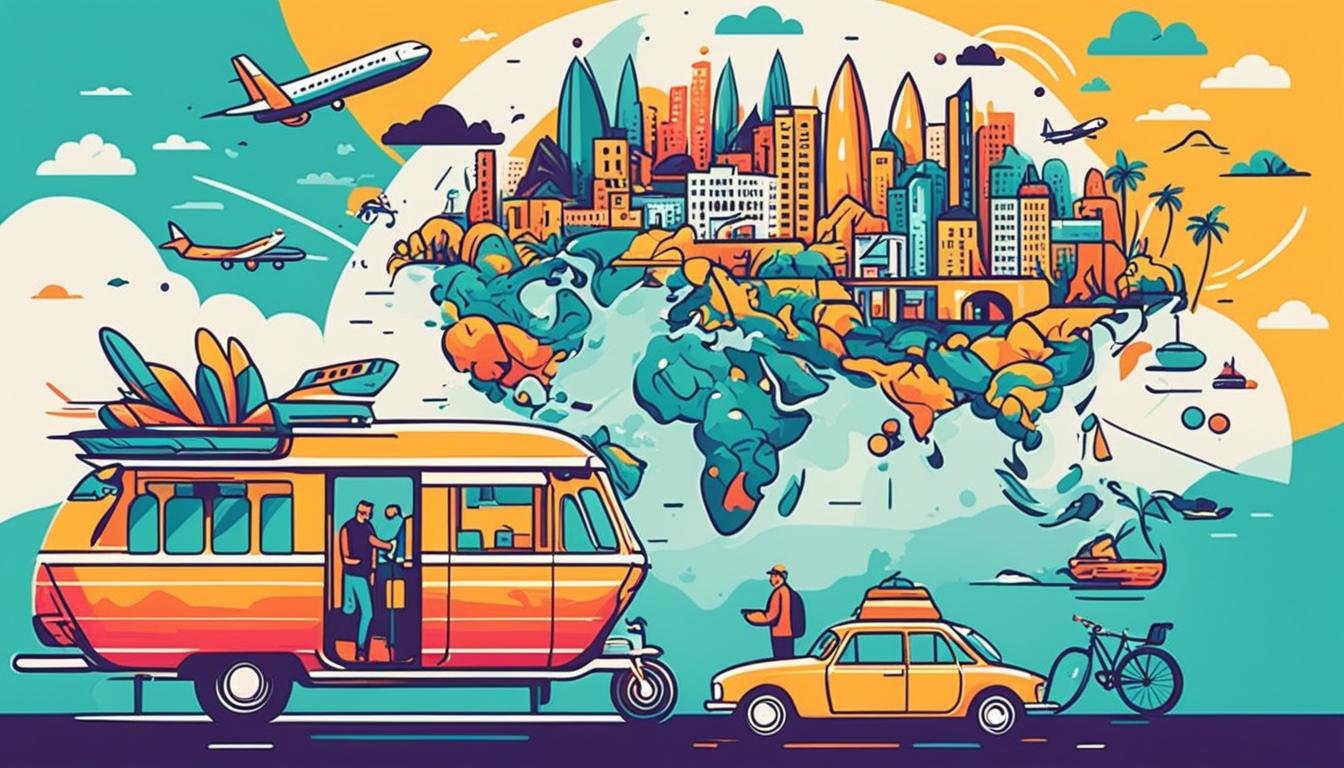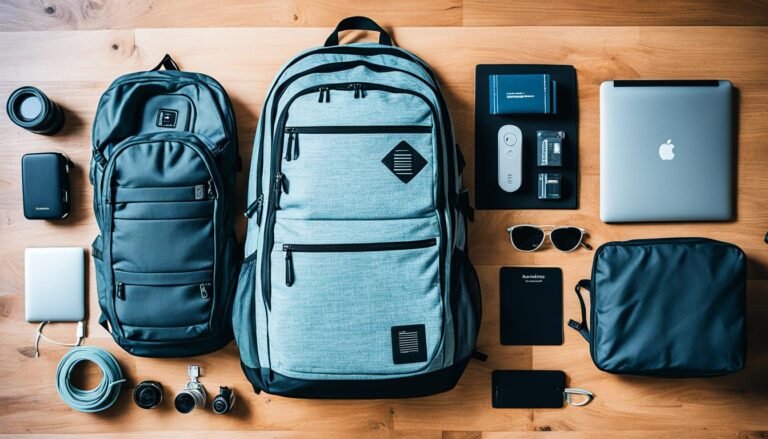Digital Nomad Success Stories: Lessons from the Road
In today’s world, the Remote Work Lifestyle is easier than before. Daniel Ferrer’s story shows the good and bad of living as a Digital Nomad. He left his $2,100-per-month apartment in Los Angeles to travel to 11 countries in four months. He worked as a customer success manager all the while.
This big change made Daniel rethink what success means. He now values life experiences and growing personally more than career success.
Many others have found the same benefits from the Digital Nomad Lifestyle Learnings. They save a lot of money, dive into new cultures, and make new friends. Daniel met many people on his travels, unlike staying in one place.
Platforms like Instagram help with networking. Small acts, like giving gifts to flight attendants, make traveling better.
For Daniel, this journey started in 2015. He learned to set clear goals and keep a schedule to stay productive. He also suggests getting a local SIM card for good internet when staying in one place for a while.
Key Takeaways
- Living costs for digital nomads generally range from $1,500 to $2,500 per month.
- Effective networking on platforms like Instagram is essential for success.
- Making friends on the road can lead to more interactions than living in one place for years.
- Reevaluating life priorities can lead to a more fulfilling lifestyle.
- Setting S.M.A.R.T. objectives and schedules is crucial for productivity.
The Appeal of the Digital Nomad Lifestyle
The digital nomad lifestyle is alluring, offering freedom, exploration, and financial flexibility. It has grown to include about 35 million people worldwide. This growth is thanks to tech advances and more remote work options.
The Freedom to Work From Anywhere
At the heart of this lifestyle is the freedom to work from anywhere. Professionals can pick from about 70 cities globally. They often choose places in Africa and Europe.
This freedom means more than just traveling. It lets people organize tasks based on where they work best. Tools like Trello help with this, boosting productivity and keeping businesses running smoothly.
Cultural Immersion and Exploration
Being a digital nomad means diving into new cultures and making new friends. It offers chances to experience different ways of life. House-sitting helps with accommodation, saving a lot on rent.
Traveling this way also supports sustainable living. Many use public transport or walk. Sometimes, renting a car is needed, but it’s cheaper than owning one.
Financial Independence and Flexibility
This lifestyle brings financial freedom and flexibility. Nomads often spend less on living than those who stay in one place. Daniel Ferrer, for example, cut his monthly costs a lot by living this way.
They keep their belongings to just two suitcases and use online banking and digital payments. This simple life is practical and frees people from old living standards.
Remote workers are often more productive, thanks to tools like project management software. More people prefer blending work and life, making this lifestyle more popular. It offers real financial freedom and flexibility.
Overcoming Challenges on the Road
Becoming a digital nomad is exciting and full of new opportunities. But, it also has its own set of challenges. Experienced nomads share tips on handling time zones, keeping internet connections strong, and balancing work and travel.
Navigating Time Zones and Communication
Dealing with time zones is a big challenge for digital nomads. They work across different continents and need to find a way to communicate well. A key piece of Nomadic Career Advice is to use tools like Google Calendar to manage time zones. It’s also important to talk clearly with clients and team members about when you’re available.
Maintaining Reliable Internet Connections
For digital nomads, a steady internet connection is essential. Getting a local SIM card or a pocket WiFi device helps keep you connected. Before you go to a new place, look for co-working spaces or cafes with good WiFi. This tip from Global Remote Work Experiences shows that having reliable internet is key to staying productive.
Balancing Work and Travel
Finding a balance between work and exploring new places is tough. Being careful with how you manage your time helps. Set aside specific hours for work and fun to enjoy both fully. Experienced travelers say it’s important to set limits to avoid getting overwhelmed with work. This way, you can have a good mix of being productive and having adventures.
Personal Growth and New Perspectives
Living as a digital nomad brings big chances for personal growth and new views. You learn to adapt to new cultures and places, which builds resilience and patience. These are key for doing well as a digital nomad. Many in the traveling entrepreneur world focus on learning and getting new skills.
Daniel Ferrer’s story shows how he moved from focusing on his career to enjoying life more. Many digital nomads say that trying new things and diving into different cultures helps them grow personally.
Building Patience and Resilience
Life on the road brings daily challenges that help build patience and resilience. You might face language barriers, deal with foreign country rules, or handle stress from working remotely. These challenges make you keep going and adapt. They shape a strong character that can handle life’s ups and downs well.
Adaptive Skills for New Environments
Being able to adapt is key to doing well in new places. Tips for traveling entrepreneurs stress the need to be flexible and open to change. This flexibility helps in both work and personal life, letting digital nomads easily switch between different roles and places. By working and living in various settings, you get better at thinking on your feet, solving problems quickly, and gaining valuable global skills.
The digital nomad life is great for growing patience, resilience, and adaptability. These skills help with personal growth and make it easier to work remotely. The advice from experienced nomads gives important tips for those thinking about this exciting journey.
Social Media as a Networking Tool
Being a digital nomad means using technology to connect and grow. Social media is key in building these connections. Instagram, for example, helps digital nomads keep in touch and find new chances.
Connecting with Fellow Travelers
Social media has become a must-have for digital nomads. Daniel Ferrer met a life-changing friend on Instagram, leading him to run with bulls in Pamplona. This shows how social media helps keep us connected and improves our work-from-anywhere lifestyle.
About 70% of digital nomads always stay online to keep up with friends and work. And 30% always have their laptops ready to not miss any important work chats.
Opportunities Found Through Social Platforms
Many digital nomads have found jobs and events through social media. Sites like Facebook and LinkedIn are key for making work connections. About 60% of them work with teams across different time zones, using these platforms to keep projects on track.
Having flexible schedules is crucial for digital nomads. About 45% say they need to be flexible because travel plans can change. Social media makes this easy by allowing quick team meetings and updates.
In the end, social media makes the remote work life better. It lets digital nomads share their stories and grab new chances, leading to growth in both work and life.
Managing Finances and Expenses
Being a digital nomad means dealing with changing incomes and costs. But, with good money management, you can gain financial independence and flexibility. Here are some tips to help you manage your money while traveling.
Cutting Down on Living Costs
Choosing affordable places to live is a great way to save money. Many digital nomads pick places like Southeast Asia, India, and Sri Lanka because they’re cheaper than Western countries. Nick and his partner spent about $50 a day for 13 months in these areas.
They saved up $40,000 before leaving and sold things like a car and condo to fund their trip. This way, they made their $30,000 trip possible.
Using sites like Trusted House Sitters can also cut costs. You can live in homes for free by taking care of pets. Also, having separate savings accounts for emergencies and personal and business expenses helps manage money better.
Tips for Budgeting on the Go
Good budgeting means setting clear goals and sticking to them. Apps like Mint or YNAB help track your money, set budgets, and keep an eye on your goals. It’s also smart to save 3-6 months’ expenses for emergencies.
“Planning is key to financial flexibility and ensuring that you can enjoy your travels without the stress of financial uncertainty.” — Advice from experienced digital nomads
Nick and his partner spent just $88 a day on their second trip, which covered Europe, Africa, the Middle East, and Asia. They saved $55,000 for the whole trip by being careful with their budget.
Having a steady income, like from a travel blog, helps a lot with money security. Nick and his partner make $3,000 to $5,000 a month from their blog, sometimes more.
It’s also important to follow tax rules in your home country and where you live. Using software like Quickbooks or Xero makes tracking taxes easier and keeps your finances accurate.
To master your finances as a digital nomad, plan well, stick to your budget, and use the right tools. This way, you can enjoy financial independence and flexibility in your budget travel life.
Lessons from the Road: Time Management and Productivity
For many location independent professionals, staying productive is key. A Forbes article shows that 7.3 million Americans now call themselves digital nomads, up from 2.3 million last year.
To keep up, digital nomads use structured schedules and set S.M.A.R.T. goals. Having a routine helps with time management and boosts efficiency. Data shows 44% of digital nomads still have traditional jobs, showing the importance of balancing work and travel.
“While on the road for eight months, I met digital nomads from various demographics, including young bloggers, digital marketers, couples in their 30s working in research or IT, and Baby Boomers in sales, photography, or journalism,” says Yoav Bulshtein, a seasoned digital nomad. “Being organized was a key factor for all of them.”
Managing work hours is vital for digital nomads. Tips like setting specific work and travel times and using task management tools help a lot. These strategies ease the stress of unpredictable plans and limited WiFi.
Keeping in touch with employers and clients is also crucial. It’s important to be clear about your schedule and availability.
In conclusion, focusing on productivity tips and improving time management skills is key for location independent professionals. These skills help you stay efficient and productive, even with the challenges of a nomadic lifestyle. They improve work performance and help you enjoy more time exploring new places and cultures.
Building a Support System
For digital nomads, having a strong support system is key. Joining Nomadic Community Support groups, like co-working spaces or online forums, helps. It offers both practical help and a feeling of belonging.
Sandra Abrouk has lived as a digital nomad for five years. She says building a network of support has been vital. Being part of co-living communities has let her meet others who understand her challenges.
Many digital nomads join in self-help activities like hypnotherapy and silent retreats. Sandra found a silent retreat helped her bond with strangers, making her feel part of a community.
“Having a community, tribe, or support system is crucial for thriving as a digital nomad,” experienced nomads say. A survey of 1,000 relocation clients over 7 years backs this up. It shows how important funding and sustainable living are for success.
Being flexible and ready for change is key. Successful nomads say you need to keep evolving to fit the changing digital nomad world. This helps with both career growth and personal happiness.
Regularly checking in with your goals and yourself keeps you on track. This helps you stay flexible with life’s changes. These steps help tell the many Digital Nomad Success Stories.
Digital Nomad Success Stories: Lessons from the Road
Living the digital nomad life is an adventure full of lessons. It teaches us about being adaptable, growing our skills, and the need for a backup plan. By looking at what experienced travelers have gone through, we can find great work and travel inspiration. We can learn from their varied experiences.
Learning From the Experiences of Others
Joseph Kenedy, a 26-year-old digital nomad, runs an environmental marketing agency. He shows us how to be resilient and keep learning. He’s visited over 30 countries, starting in the marketing department of an environmental company.
Over four and a half years, he saw big changes in the digital nomad world. He met at least 15 other nomads. Joseph talks about the value of community and personal growth from his Camino de Santiago hike.
The Foxes Photography team moved from finance and copywriting to photography. They use a trailer to save money while traveling. Their stories show how passion and work can come together in the digital nomad life.
Key Takeaways from Diverse Journeys
One big lesson is finding a balance between work and travel. Elliot Rozenberg of Lawyerly LLP became a digital nomad by cutting fixed costs. He lived in different hotels around the world.
He faced challenges like police incidents and getting dengue fever, but kept working and exploring. He liked places like Bangkok, Buenos Aires, and Madrid.
The Axtell family shows how to manage family life on the move. They made sure they had good Wi-Fi and adjusted to new time zones. Tiphini and Kris Axtell worked, homeschooled, and spent time with their family.
They built a strong community and lived life at a slower pace. This shows the many benefits of the digital nomad lifestyle.
These stories give us great work and travel inspiration. Using tech tools like unlimited data hotspots and apps like Slack and Google Translate helps a lot. Also, embracing local cultures, making friends, and being flexible with plans is key for a good journey.
Conclusion
The digital nomad journey is a mix of freedom and learning. It comes with challenges, but also with resilience and adaptation. Digital nomads share tips and insights from their global work experiences.
This lifestyle is tough but rewarding. It offers chances for personal and professional growth. It’s a path that demands effort but pays off in many ways.
Digital nomads often see ups and downs in their income. They make between £1,500 and £2,500 a month, sometimes reaching nearly £4,000. It’s key to have different ways to make money, like freelance writing or teaching online.
Saving money during good months helps during tough times. Even though they might earn less than in cities like London, the cost of living in places like Chiang Mai or Portugal is lower. This makes life more enjoyable.
For digital nomads like Johnny FD and Kristin Addis, discipline and adaptability are key. They set goals and stay active to succeed. Despite challenges like unpredictable work and feeling lonely, the digital nomad life is free and full of new experiences.
With the right strategies and mindset, anyone can do well as a global remote worker. They can turn challenges into opportunities for a rewarding journey.
Source Links
- I gave up my $2,100 apartment in Los Angeles and have been living as a digital nomad for 4 months. There are 4 major lessons I’ve learned along the way.
- Digital Nomad Lessons: What I Learned from One Year on The Road
- Life on the Road: My Journey as a Digital Nomad and Trader
- What life as a digital nomad really means (and the surprising doors it opened)
- From 9 to 5 to Anywhere: The Digital Nomad Lifestyle Revolution
- Thriving as a Digital Nomad Over 50 : A Journey of Exploration, Adventure, and Financial Freedom
- 32 Things I’ve Learned in 32 Years
- Digital Nomad Diaries: Earning a Living While Traveling the World
- Michael Bassin on LinkedIn: #entrepreneurship #digitalnomad #adventure #businessjourney…
- Prateeka Kamath on LinkedIn: I've been a 'digital nomad' for most of 2022 and all of 2023. It's been… | 10 comments
- Digital nomad: Marketing on the Road: Strategies for Digital Nomad Entrepreneurs – FasterCapital
- The Nomadic Productivity Guide: Achieving Success on the Road as a Digital Nomad
- Finances for Digital Nomads and Freelancers: Mastering Your Money on the Move
- Our Digital Nomad Lifestyle: Answering Your Money Questions – Goats On The Road
- Bookkeeping for the Digital Nomad: Managing Finances in a Borderless World #nase
- After 8 Months as a Digital Nomad, Here’s What I’ve Learned
- The Digital Nomad Lifestyle: A Personal Journey
- Digital Nomadship: How to Make a Living on the Road — Always the Adventure
- How Digital Nomads Can Live a More Fulfilled Everyday Life with Sandra 🌎💻
- How to Succeed in the Digital Nomad Lifestyle
- My Digital Nomad Story
- Joseph Kenedy – The digital nomad – Success Stories Magazine
- Beyond Borders: 5 Digital Nomads Share How They’re Redefining Work, Family and Travel
- Digital Nomad Life: Earnings & Challenges | Our Big Fat Travel Adventure
- inspiring tales from the road – Jorcus







